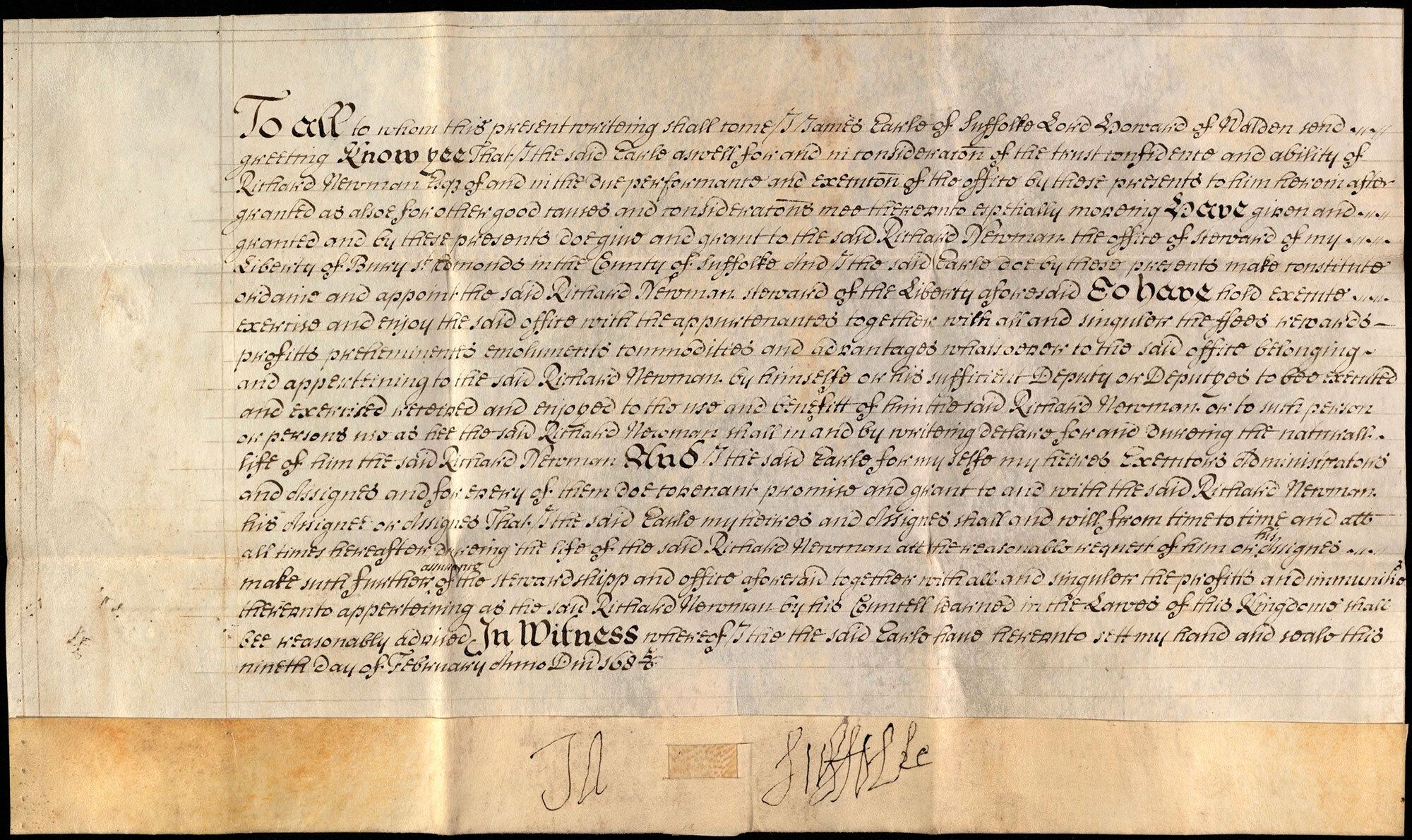Deputy Stewards
The role of the Office of the High Stewardship was often exercised by a Deputy Steward appointed by the Hereditary High Steward for that purpose. Throughout the centuries, the Hereditary High Stewards have appointed Deputy Stewards. The earliest known Deputy was Robert de Flamaville in 1188.
Pre-1500 Deputy Stewards
On 22 March 1314-15, John de Hastings, Hereditary High Steward of the Liberty of St Edmund, son of the first Baron Hastings, presented to the Abbot, Sir Geoffrey Burdeleys 'to be his deputy’. The same John de Hastings appointed in 1324 Ralph de Bocking his deputy for life agreeing to allow him his livery.
According to a statement made after the death of John de Hastings in 1375, the Hastings family had from “time immemorial” appointed under-stewards for life. The under-stewards received six shillings and eightpence from the Abbot for every court of the Liberty held within the Abbey every 3 weeks.
On occasion a Deputy Steward was related to the Hereditary High Steward as happened with Hugh Pecche who was appointed as Deputy Steward in 1247, whose wife Ida was sister of Henry de Hastings.
A well-known Deputy Steward appointed in 1398 was Sir John Bussy, speaker of the House of Commons and a supporter of Richard II, King of England. Sir John Bussy was created a Deputy Steward in 1398. The following year when Henry IV, King of England returned from exile, Bussy was captured on 28 July 1399 and beheaded for treason. He appears in William Shakespeare’s play Richard II as one of the 3 councillors.
Deputy Stewards under Howard
Thomas Howard, 4th Duke of Norfolk, Hereditary High Steward of the Liberty of St Edmund (1536-72)
A Grant signed by Thomas Howard, 4th Duke of Norfolk, Hereditary High Steward of the Liberty of St Edmund creating Thomas Kytson and Thomas Andrewes as joint Deputy Stewards 1567
In 1567 Thomas Howard, 4th Duke of Norfolk (1536-72) granted the Office of Deputy Stewards jointly to Thomas Kytson of Hengrave, and Thomas Andrewes, the latter a Justice of the Peace and Governor of Bury Grammer School.
Thomas Kytson’s aunt, Margaret Kytson, married John Washington, ancestor of George Washington, first President of United States of America (1789-97).
Letters Patent dated 9 February 1685 whereby James Howard, 3rd Earl of Suffolk, and Lord Howard de Walden, Hereditary High Steward of the Liberty of St Edmund, created Richard Newman Esq his Deputy Steward
Letters Patent dated 10 February 1685 whereby James Howard, 3rd Earl of Suffolk, and Lord Howard de Walden, Hereditary High Steward of the Liberty of St Edmund, created Robert Cozens Esq their Deputy Steward.
Deputy Stewards under Jermyn, Davers, and Hervey
The Jermyn and Davers Hereditary High Stewards continued to appoint Deputy Stewards. Sir Charles Davers (1737–1806) was still overseeing Courts every 3 weeks in the Liberty and would have relied on the support of his Deputy Stewards for this.
Sir Charles Davers, 6th Baronet, Hereditary High Steward of the Liberty of St Edmund (1737-1806)
Frederick Hervey, 5th Earl of Bristol, later 1st Marquess of Bristol, Hereditary High Steward of the Liberty of St Edmund (1769-1859)
A poster concerning the execution of Writs in the Liberty, with Frederick Hervey, 5th Earl of Bristol, later 1 st Marquess of Bristol, carrying out his duty as Hereditary High Steward, helped by his Deputy Steward, Mr Holmes
Frederick Hervey, 1st Marquess of Bristol continued to appoint and be supported by his Deputy Stewards in order to carry out his work in the Liberty, as can be seen by the above Writ where his deputy is Mr Holmes. We know that Frederick Hervey, 3rd Marquess of Bristol was active as Hereditary High Steward and likely appointed Deputy Stewards to support him.






